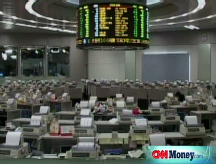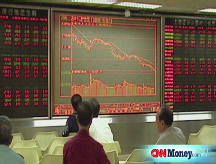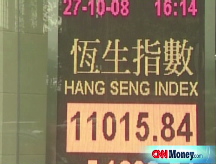Yen strength continues
Global finance ministers hint at intervention, citing 'excessive volatility' in Japanese currency.
NEW YORK (CNNMoney.com) -- The yen continued to rise Monday and the dollar held firm against other currencies despite signs that a government intervention in the currency market may be on the horizon.
The dollar fell to ¥94.09 Monday from ¥94.63 late Friday. On Friday, the yen drove the dollar to a 13-year low of ¥91.10.
The euro traded at $1.2541, down from $1.2586. And the British pound fell to $1.5647 from $1.5904.
Recent turmoil in the world's financial markets and concerns about a global recession have driven investors away from high-yielding currencies such as the euro and the pound. As a result, lower-yielding currencies like the dollar and the yen have surged in value because they are considered by many investors to be a safe-haven.
Japan's yen has been the main beneficiary of the market's recent aversion to risk.
But the yen has also been supported by reversals in the so-called carry trade. Investors often borrow yen to fund investments in higher-yielding currencies. When those currencies weaken, and investors reverse their positions, they are forced to buy back the yen, raising its value.
The influx of yen has fueled concern about the health of Japan's export driven economy. A stronger yen can hurt Japanese companies that sell goods overseas when profits are translated back into yen.
Japan's benchmark Nikkei index fell 6.4% to close at its lowest level in 26 years as investors fretted over the consequences of a stronger yen.
And the yen's sharp rise has alarmed some finance ministers from the Group of Seven major industrial countries, who say it could be a threat to the stability of the global economy.
"We are concerned about the recent excessive volatility in the exchange rate of the yen and its possible adverse implications for economic and financial stability," the G-7 finance officials said in a joint statement Monday.
While the statement said the G-7 will continue to "monitor markets closely" and will "cooperate as appropriate," it stopped short of saying the group will immediately intervene.
Still, the G-7 statement has many investors in the currency market "hedging their bets," said Steve Malyon, currency analyst at Scotia Capital in Toronto.
"The market is now wondering whether there might be a coordinated intervention to stabilize currency markets," Malyon said.
Malyon said such an intervention would likely involve "some form of yen selling" and could also be aimed at strengthening the dollar.
But many strategists doubt an intervention will slow the yen's rise.
"Chances of a successful yen-selling intervention are weak at best as long as the currency remains boosted," wrote Ashraf Laidi, Chief FX Strategist at CMC Markets in New York, in a research note titled "Yen Intervention Will Not Work."
Laidi argues that recent government efforts, including a coordinated rate cut and capital injections, have gone largely overlooked. And that does not bode well for an intervention in the currency markets.
"Overall selling in global equity markets remains underscored by markets' overwhelming lack of reaction to authorities' actions," Laidi said.
Meanwhile, currency traders will be keeping a close eye on global stock markets and will be watching the world's central banks for signs that another coordinated rate cut is in the works, Malyon said.
Stocks in the United States opened sharply lower following weakness in overseas markets. But U.S. shares were roughly 1.5% higher with about two hours left in the session.
European shares were mixed. The CAC-40 in Paris tumbled nearly 4%. But Germany's DAX closed nearly 1% higher and London's FTSE slid less than 1%.
Investors are expecting the Federal Reserve to cut interest rates by one-half of a percentage point when the central bank meets this week, according to futures on the Chicago Board of Trade.
Laidi said there is a chance that the Fed could cut interest rates by three-quarters of a percentage point on Wednesday, though he thinks the market's response may be short-lived.
Central banks worldwide announced a coordinated rate cut on Oct. 8 that brought the Fed's benchmark rate to 1.5%. While investors welcomed the emergency rate cut, stock prices have continued to fall, tumbling nearly 10% since it was announced.
Another global interest rate cut "will likely trigger a short-term boost in risk appetite and equities at the expense of the yen and the dollar, but the duration of the reaction is more relevant," Laidi wrote in a recent research note. ![]()





